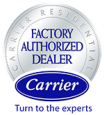When it comes to home comfort systems, heat pumps emerge as a highly efficient and versatile option. If you are in the market for one, it helps to be aware of its efficiency and performance ratings, as they are crucial for achieving maximum comfort while minimizing energy use and cost. Albert Air Inc. explains what you need to know below.

The Significance of Heat Pump Efficiency Ratings
Heat pumps are celebrated for their ability to efficiently heat and cool homes. Efficiency ratings such as SEER (Seasonal Energy Efficiency Ratio), HSPF (Heating Seasonal Performance Factor), and COP (Coefficient of Performance) are vital metrics in evaluating a heat pump’s performance. These ratings help you understand how well a unit can convert electricity into cooling or heating, affecting your energy bills and environmental footprint.
SEER and HSPF: Ratings for Cooling and Heating Efficiency
The SEER rating measures the cooling efficiency of a heat pump over a typical cooling season. Similarly, the HSPF rating reflects the heating efficiency during the heating season. For optimal performance in selecting a heat pump with a high SEER rating is crucial due to the region’s warm climate. Modern heat pumps typically have SEER ratings ranging from 14 to 25, enabling homeowners to enjoy significant energy savings during the hot months.
The Role of COP in Understanding Heat Pump Performance
The COP rating is another critical efficiency metric, representing the heat pump’s heating efficiency at a specific temperature. Heat pumps with higher COP values offer greater efficiency, ensuring your home remains comfortable even during cooler periods without incurring high electricity costs.
Factors Affecting Heat Pump Efficiency
Beyond ratings, several factors influence the efficiency and performance of a heat pump:
- Sizing and Installation. Proper sizing and professional installation are paramount when choosing a heat pump. An undersized or oversized heat pump can lead to uneven temperatures and increased energy consumption.
- Climate Considerations. The efficiency of a heat pump can vary based on local climate conditions. Consider those equipped with features designed for better performance in varied temperatures.
- Technology and Components. Advancements in technology, such as modulating compressors and better heat exchanger designs, have significantly improved the efficiency of modern heat pumps.
Optimizing Heat Pump Efficiency
To maximize your heat pump’s efficiency and lifespan, make sure to keep in mind the following:
- Keep it well-maintained. Clean the outdoor unit and replace dirty filters regularly. Have a technician take a good look at its internal components as well, including refrigerant levels.
- Install a smart thermostat for more accurate temperature control and energy usage monitoring.
- Evaluate your home’s insulation and air sealing to prevent energy loss, thereby reducing the load on your heat pump.
At Albert Air Inc., we offer only the highest quality products from Carrier®, the country’s trusted HVAC brand. From gas furnaces and air conditioners to heat pumps and indoor air quality solutions, our units deliver reliable and long-lasting performance. Call us at (714) 526-6368, or fill out our contact form today to schedule an appointment.





